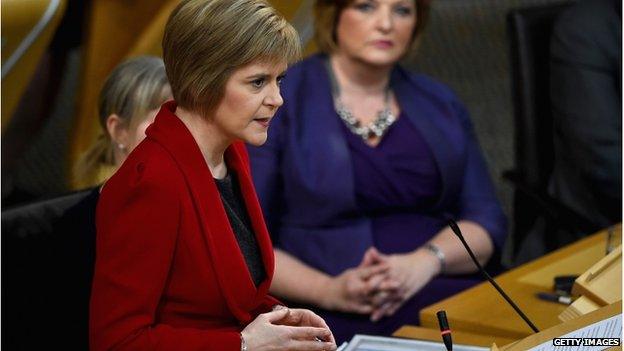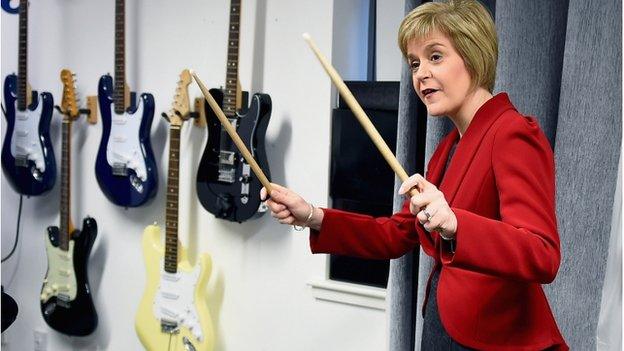Balancing act for Nicola Sturgeon's government programme
- Published

Nicola Sturgeon said in advance - not least at the SNP conference - that her aim was to balance the search for social justice with pursuing economic growth.
She said again today in presenting her Programme for Government that she wanted to achieve "participation, prosperity and fairness".
Perhaps inevitably, it is the rhetoric about fairness and distribution which comes to the fore. That is partly because it is more eye-catching and ear-grabbing to talk about helping the poor than to calibrate business rates.
It is also partly because of the nature of Nicola Sturgeon. She stressed she remained a passionate advocate of independence. But she is also fired up by social justice. Talking of relative poverty, she ad-libbed a description of current circumstances. They were, she said, a "scandal".

Nicola Sturgeon holds up drum sticks during a visit to The Kabin community learning centre on Wednesday
Hence, an Education Bill designed to improve attainment all round - but especially for the most disadvantaged. Hence measures to promote the living wage.
Economy and society
Again, though, in these cases and with regard to other issues, Ms Sturgeon made the link with economic development. For example, better education and pay were advantageous to individuals - but also to the economy and society.
She stressed that "a strong economy is essential to our success." This does not draw backbench applause like the sections on social disadvantage - but Ms Sturgeon is careful to include such comments in her analysis of contemporary Scotland.
Jackie Baillie for Labour was supportive - in that she applauded the aims of social justice. But sceptical in that she doubted whether delivery would follow. She suggested, for example, that the SNP had been less than evangelical in earlier days about the living wage. (This was vigorously disputed.)
Ms Baillie said of the First Minister that she "talks Left but walks Right". Ms Sturgeon looked ever so slightly pained in response.
There were echoes of history. A land reform bill. The eventual outcome here may be somewhat less radical than suggestions from a review group but Ms Sturgeon was adamant that the ancient misalignment of land ownership in Scotland would be adjusted.
And the Poll Tax - or Community Charge as it will undoubtedly be dubbed, once more, in legislation. Historic debts are to be written off.
Human trafficking
In this field, one more moment of history. Yet another commission to search for a "fairer" system of local taxation. Ms Sturgeon appealed for cross-party engagement with that. Certainly, other parties have comparably struggled - and, to-date, failed - to replace the Council Tax. Perhaps they might share their angst with each other.
Nary a mention from Ms Sturgeon in this regard of the Local Income Tax, once supported by the SNP. It may, of course, revive in the commission's consultation - but my guess is it has been quietly dumped.
Other significant measures. Action to support carers. Action to counter domestic abuse. A bill to tackle human trafficking. Ms Sturgeon, indeed, closed with that latter measure: an appeal, once again, for cross-party endeavour.
It was an effective performance: well presented and substantial. Much, too, for parliament to be getting on with under current powers. Ms Sturgeon speculated how much more could be done with enhanced powers. But that is a topic for tomorrow and the Smith Commission.